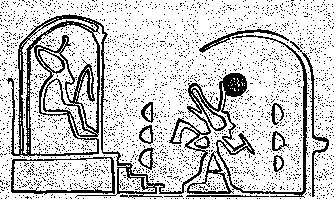2. Number 432 is not arbitrary, it has a long history:
"A Sumerian tablet, now in Oxford (Weld-Blundell, 623), gives a list of ten mythological kings who ruled for a total of 456,000 years in the period between the first descent of kingship from the courts of heaven upon the cities of men and the coming of the Flood. A second tablet (Weld-Blundell, 144) names only eight of these kings, with a total of 241,200 years; and a third list, very much later, composed in Greece c. 280 B.C. by the learned Babylonian priest Berossos ... gives all ten kings again, but with a total of 432,000 years - which is an extremely interesting sum. For in the Icelandic Poetic Edda it is told that in Odin's heavenly warrior hall there were 540 doors: Five hundred doors and forty there are, // I ween, in Valhall's walls; // Eight hundred fighters through each door fare // When to war with the Wolf they go. The 'war with the Wolf' in that mythology was the recurrent cosmic battle of the gods and the antigods at the end of each cosmic round (the Götterdämmerung of Wagner's Ring), and as the reader - ever alert - has no doubt already realized, 540 times 800 is 432,000, which is the number given by Berossos for the sum of years of the antediluvian kings. Furthermore, in the Indian Mahabharata, and other texts of the Puranic period (c. 400 A.D. and thereafter), the cosmic cycle of four world ages numbers 12,000 'divine years' of 360 'human years' each, which is 4,320,000 human years; and our particular portion of the cycle, the last and worst, the so-called Kali Yuga, is exactly one-tenth of that sum. So that we have found this number, now, in Europe, c. 1100 A.D., in India, c. 400 A.D., and in Mesopotamia c 300 B.C., with reference in each case to the measure of a cosmic eon." (Campbell The Masks of God: Oriental Mythology.) The Wolf to be fought at the end of a cosmic round is probably Upwaut, the Opener of the Way (cfr at A Common Sign Vocaubulary): ... The king, wearing now a short, stiff archaic mantle, walks in a grave and stately manner to the sanctuary of the wolf-god Upwaut, the 'Opener of the Way', where he anoints the sacred standard and, preceded by this, marches to the palace chapel, into which he disappears. A period of time elapses during which the pharaoh is no longer manifest.
When he reappears he is clothed as in the Narmer palette, wearing the kilt with Hathor belt and bull's tail attatched. In his right hand he holds the flail scepter and in his left, instead of the usual crook of the Good Shepherd, an object resembling a small scroll, called the Will, the House Document, or Secret of the Two Partners, which he exhibits in triumph, proclaiming to all in attendance that it was given him by his dead father Osiris, in the presence of the earth-god Geb. 'I have run', he cries, 'holding the Secret of the Two Partners, the Will that my father has given me before Geb. I have passed through the land and touched the four sides of it. I traverse it as I desire.' ... It would hardly be surprising to find 432 (and also other numbers in the mentioned king lists) in the rongorongo texts. But numbers are elusive, they are easy to perceive where they have not been intended to be. We therefore need the king lists referred to by Campbell in order to give us a more secure view of what numbers to expect:
The antediluvian king lists end with Noah and the corresponding kings (Ubardudu, Zíusudra, and Xisuthros). The time of the deluge varies, though:
24 is equal to 72 / 3, and 456 - 432 = 24, perhaps to be interpreted as the number of days from Achernar at the beginning of Eridanus to Botein at the end of Aries:
Aries can be said to stretch from Alrisha to Botein, i.e. for 19 (= 456 / 24) days. The deluge according to G could stretch for 40 days counted from Achernar and to the end of side b. The stars of Eridanus, far down in the south, correspond to the Flood, because that is the meaning of Eridanus. |
||||||||||||||||||||||||||||||||||||||||||||||||||||||||||||||||||||||||||||||||||||||||||||||||||||||||||||||||||||||||||||||||||||||||||||||||||||||



